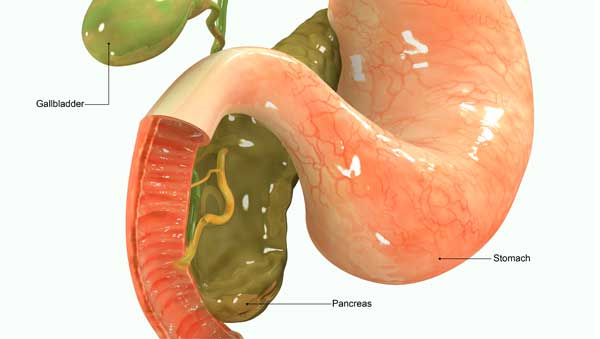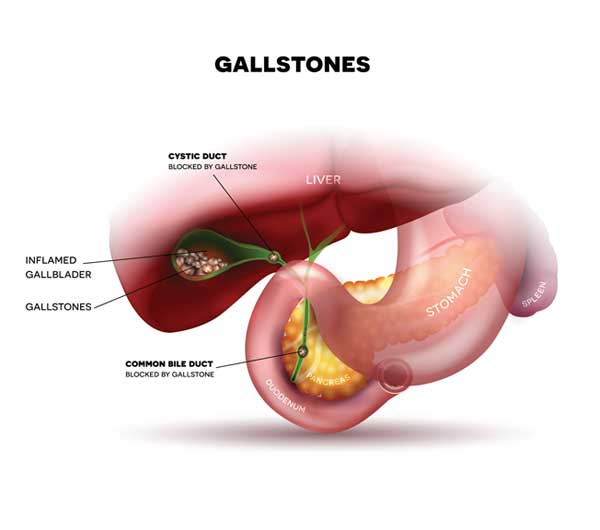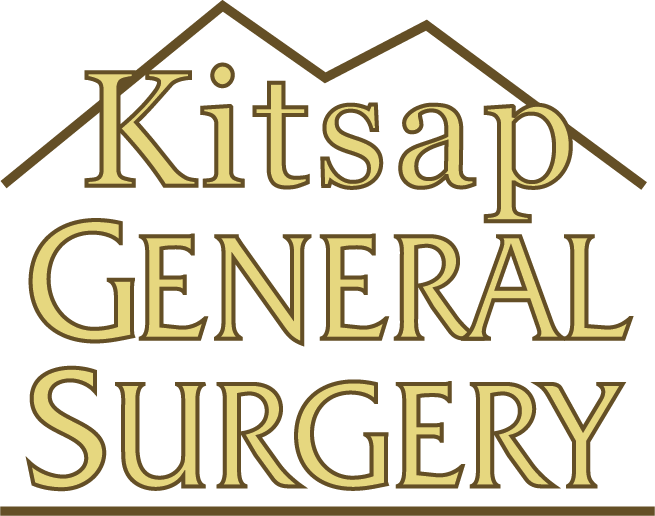Gallbladder
What Is Gallbladder?

The gallbladder is a pear sized bag that lays underneath the liver. It comes off of the main bile tube which connects the liver to the small intestine. The gallbladder stores bile which is used in the digestion of fatty foods. In pre-modern times, Neanderthals would kill and eat a Woolly Mammoth and then go several days before eating another one. So they would get a high-fat load, over a short period of time, with a long time until they would eat again. The gallbladder stores the bile used in the digestion of that food. In modern times, we eat between two and four meals a day and so our liver is able to secreate enough bile to digest the fat in our foods.
What Goes Wrong With Gallbladders?

There are many forms of gallbladder disease. The two most common forms happen when a patient has stones in the gallbladder. One possibility is that a stone will block the tube to the gallbladder and the gallbladder becomes infected (this is
called acute cholecystitis). In the other possibility, thestones cause irritation of the gallbladder causing intermittent pain (called symptomatic cholelithiasis).
Other forms of gallbladder disease include when the gallbladder stops contracting well and causes pain (called biliary dyskensia). Also, a stone can block the main bile tube causing an infection (ascending cholangitis). Another form of disease is when a stone can cause a blockage of the main bile tube along with the pancreatic tube, causing pancreatitis.
What Are The Symptoms Of Gallbladder Disease?
The most common presentation is pain in the right upper belly. It usually starts half an hour to several hours after eating fatty food. The pain will last several hours and may or may not resolve without medical treatment. After having a second attack, usually attacks become more and more frequent. The pain can then become constant with spikes of more intense pain after eating anything.
It also can present as pain with a fever, chills, nausea, or vomiting. Some people have symptoms of reflux or burping, but this is less common and may or may not resolve with treatment.
How Is Gallbladder Disease Treated?
Some people are able to control the symptoms with a low fat diet for a period of time. Most of the time this eventually fails. There is a medication (Ursodiol) that some people take. This medication doesn’t work very well and is usually just used in people who are very sick and can’t tolerate surgery.
Surgery is the most common recommended treatment. Four incisions are made in the abdomen and the belly is filled with gas. The gallbladder is then identified and removed.
What Are The Complications Of Gallbladder Surgery?
Risks include bleeding, infection, and damage of surrounding organs. It can also result in heart attack, stroke, and death (uncommon). It is also possible that there can be a leak from the bile tube (about one in 200 cases) or damage to the main bile tube (between one in three hundred and one in five hundred cases).
What Is My Recovery Time From Gallbladder Surgery?
You shouldn’t lift more than 10 pounds for 2-6 weeks. You shouldn’t shower for 2 days, or take tub baths or swim for 2 weeks. This is often a same day surgery where you go home the same day. You should get up and move as much as possible. People will often be sore for several days after surgery, but that gets better with time. Some people will have a poor appetite after surgery. There are no specific dietary restrictions after surgery. You can eat what you feel like. However, some people notice new intolerances to various foods. If something bothers you, you shouldn’t eat it for a week or two and then try the food again.
Call Us
360.613.1335
Message Us
To request an appointment
Locate Us
Get directions to our office
